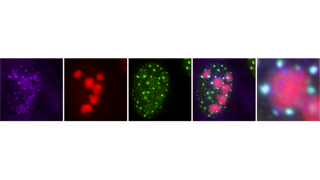The mysteries of quantum physics and the universe are solved on walks around Lake Jyväsjärvi

Lakeside Quantum Dialogue event brings a group of quantum computing researchers in Jyväskylä. The annual event gather’s researchers not only from Finland but also from all over the world.
The idea is to find new opportunities for collaboration and exchange ideas on quantum computing research in a more relaxed atmosphere than a normal conference, says the father of the event Teiko Heinosaari, a professor in quantum computing at the University of Jyväskylä.
Discussions take place not only at the university, but also on walks along the beautiful shores of Lake Jyväsjärvi.
One of the guests and speakers was Professor Sarah Croke, a renowned quantum physics professor at Glasgow University, who is visiting the event and Jyväskylä already for the second time.
Normally, conferences are really intense. Here, there is much more time for talks and discussion between the talks.
"I visited last year and really liked the concept. Normally, conferences are really intense. They consist of short, often deeply technical talks and it’s sometimes hard to keep up with the content. Here, there is much more time for talks and discussion between the talks," says Croke.

The University of Jyväskylä is located by the Lake Jyväsjärvi, with walkways around the lake providing a unique setting for discussions on quantum computing. Photo: University of Jyväskylä.
In fact, Croke loved the event and the setting so much that she had planned to bring two colleagues from Glasgow along. However, their trip was disrupted by a flight strike.
“Next year, we intend to participate with a bigger group,” Croke laughs.
“Every time we as a humankind find a new way to look at the sky – it’s like a completely new sense that’s have been opened”
As a science, quantum computing is still in its early stage, but both Heinosaari and Croke believe it will dramatically advance science and possibly even the way humanity understands the universe around us.
Croke takes her and her research team’s research as an example. The research group is trying to find out whether quantum computers could help in gravitational waves research. Detecting and studying gravitational waves involves big computational problems that conventional computers are not able to solve.
Gravitational waves is a phenomenon originally predicted by Albert Einstein's theory of relativity, which scientists have been trying to measure since the 1970s. They were first successfully detected in 2015.

For Sarah Croke, the graffiti on the bridge adds an interesting angle to the picturesque surroundings. Heinosaari, on the other hand, does not entirely agree with Croke on the graffiti. Photo: University of Jyväskylä.
So what use can this research have in real world?
Heinosaari and Croke chuckle at the idea that all the uses and benefits of research should be known in advance.
“Every time we as a humankind find a new way to look at the sky – it’s like a completely new sense that’s have been opened”, Heinosaari excitedly says.
At first, we looked at the world only in the visible spectrum of light. Then came radio waves and after that, other parts of the electromagnetic spectrum.
The study of gravitational waves gives us a completely new way of looking at and studying the universe and astrophysical objects.
“The study of gravitational waves gives us a completely new way of looking at and studying the universe and astrophysical objects. When we first discovered electromagnetic waves no one really thought that we were going to use them in phones – so who knows what we can do with gravitational waves," Croke adds.
What is certain is that quantum computing and quantum computers will help us to better understand the universe around us. Of which the study of gravitational waves is just one example.








